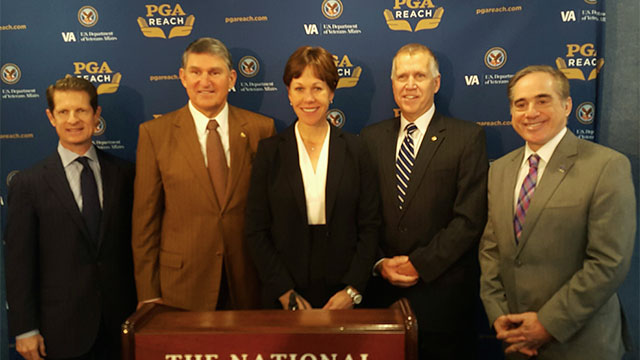NEWS
History made as VA partners with PGA REACH to support PGA HOPE
By Bob Denney
Published on

WASHINGTON, D.C. – In a Centennial year, the PGA of America etched a new piece of history Tuesday that will resonate past the boundaries of a golf course.
The U.S. Department of Veterans Affairs (VA) is now a partner with PGA REACH, the philanthropic arm of PGA of America, to bring a specialized golf program to disabled Veterans. Spanning a century of commitment to those men and women in uniform, the PGA has steadily expanded its teaching expertise in adaptive golf.
The partnership announced at the National Press Club in Washington, D.C., elevates PGA HOPE (Helping Our Patriots Everywhere) – an interaction between the PGA Professional and the Veteran – to a new level.
“This is an extraordinary program,” said Dr. David Shulkin, Under Secretary of Health for the VA. “The ability to use adaptive sports to help heal veterans and to create synergy between health and well-being is really terrific. The ability for governmental agencies to reach out to organizations like the PGA and develop partnerships is making us a better organization.”
The announcement attracted PGA and VA leaders, veterans and Senators Thom Tillis (R-NC) and Joe Manchin (D-WV), members of the Senate Armed Services and Veterans Affairs Committee.
Noting the path by which he undertook his commitment to veterans in his career, Sen. Manchin recognized veterans in the room, adding, “These people have committed to taking a bullet for you. When you think about the commitment they’ve made, it’s remarkable. For the one percent of those who have made a commitment to protect us, what we do for them today in programs like this is the least that we can do.
“I thank the PGA for giving and reaching out to veterans. All of you who support PGA HOPE, I salute you.”
Sen. Tillis, whose North Carolina constituency is approaching nearly one million veterans, said that “an important part of truly transforming and doing the right thing for veterans are the kinds of things that you will do with PGA REACH and, in particular, PGA HOPE. Working with the private sector and non-profits is critically important.
“The therapeutic value of having veterans, sharing either the invisible or visible wounds of war and doing it in the setting of golf cannot be understated.”
The purpose of PGA HOPE is to help Veterans assimilate back into their communities through the social interaction the game of golf provides. Led by PGA professionals – certified in golf instruction for Veterans with disabilities, Veterans will learn the rules of the game, and for those already familiar with it, the professionals will help them refine their skills.
“The game of golf is a proven activity that enables veterans to interact and provides them hope,” said PGA Secretary Suzy Whaley of Farmington, Connecticut. “PGA HOPE programming is fully funded by PGA REACH and delivered at no cost to Veterans or their families. For our PGA Professionals, me included, to be able to work with you veterans is not only a privilege but a greater inspiration.”
PGA HOPE currently has 50 programs across 20 PGA sections, enhancing the lives of more than 2,000 Veterans nationwide. PGA REACH is driving toward programming in all 41 PGA Sections by the end of 2016, said Whaley.
Josh McCoy, 33, a VA Adaptive Sports Program Specialist, works with the Paralympic Allowance, and is a staff sergeant in the Army National Guard. McCoy said that he was uplifted by what he called a “new two-part beginning for golf and the VA.”
“I think with any federal agency, there is a lot of bureaucracy going on and people are always well-intended in getting veterans out there,” said McCoy, “but this partnership not only opens doors for veterans but also for providers to give that care and have something in their tool kits to get involved.
“One of the biggest things about golf is the accessibility, because golf courses are everywhere,” said McCoy. “Anyone who has a catastrophic physical or mental disability, there are things for them to do. It’s a sport that is highly adaptable to any injury.”
Ernie Butler, the National Sports Director of Sports and Recreation for the Paralyzed Veterans of America was excited about golf programming and the partnership. A retired staff sergeant and former Air Force rescue man, Butler became a paraplegic after suffering an injury 20 years ago while a member of the U.S. Skydiving Team.
“When I look at an adaptive sports program, I look at what it can do for health benefits, social benefits and what the sport does to build confidence,” said Butler, 62-year-old native of St. Petersburg, Florida. “Between the para-golfer cart coming out on the market in the past eight to 10 years, it is enabling more and more like me to participate. It is great to be playing golf and I can attest to that.”
